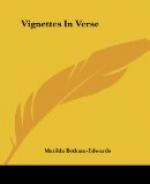If thus a stranger thinks, who knew
Him but an infant—if he grew
With all the promise that appear’d
So brightly then, still more endear’d—
If, as the Honey with the Bee,
Affection dwells with poesy:
If that Affection is comprest,
And hoarded in a Father’s breast,
Whose very soul doth blessings shed
Upon a grateful darling’s head;
While every look is treasur’d there,
Till Thought itself becomes a prayer,
And Hopes hang on him full and gay.
“As blossoms on a bough in May"[1]—
Shall any venture to intrude
On thee? Oh! not with footstep rude,
But with a timorous zeal I come,
Just hang this wreath upon his tomb—
Record fond wishes sadly o’er,
To see my little favourite more!
* * * * *
[Footnote 1:
As many hopes hang on his noble head
As blossoms on a bough in May; and sweet
ones!
—Beaumont and Fletcher.]
XXV.
Fear has to do with sacred things,
And more than all from Pity springs.
Two school-girls once—the time is past,
But ever will the memory last—
This moral to my fancy drew,
In colours brilliant, deep, and true.
Mute, blooming, one all-wondering stands,
The elder kisses oft her hands,
Bends o’er with fainting, fond caress,
And languishes in strong distress.
Clings to her shoulder, were it meet,
Seems wishing to embrace her feet;
Like one impatient to implore,
Who dreads the time is nearly o’er,
To ask or to receive a boon,
Which must be known and granted soon.
A boon with life itself entwin’d,
One that her lips refus’d to name,
However oft the impulse came.
Such was the picture—but her mind
Forgetting self—could not arise,
To look in those unconscious eyes!
The zeal that prompted, were she free
To serve her friend on bended knee,
Shrunk from the orphan’s gaze, just hurl’d,
Lonely and poor upon the world—
Unknowing yet her loss, endeared,
By its excess, and therefore fear’d!
Thus has it ever seem’d to me,
That Pity made a Deity
Of Mortal Suffering—that her ray
Melted all blame, all scorn away!
That when her arms the dying fold,
When her pure hands the loathsome hold,
Disgust and Dread, their power forego,
The Aegis drops from Human Woe,
Whose false and cruel glare alone
Turned other living hearts to stone.
XXVI.
ELEGY ON EDWARD BETHAM,
Lost in the Duchess of Gordon East Indiaman, off the Cape of Good Hope.
--------
Lovely as are the wide and sudden calms
Upon a lake, when all the waters rise,
To smooth each undulation, and present
A plain of molten silver—is the hope,
Dear Edward, of thy safety—which now comes
To fill, expand, and elevate my heart—
String every nerve, and give to every vein,
A warmer and a sweeter sense of life!




